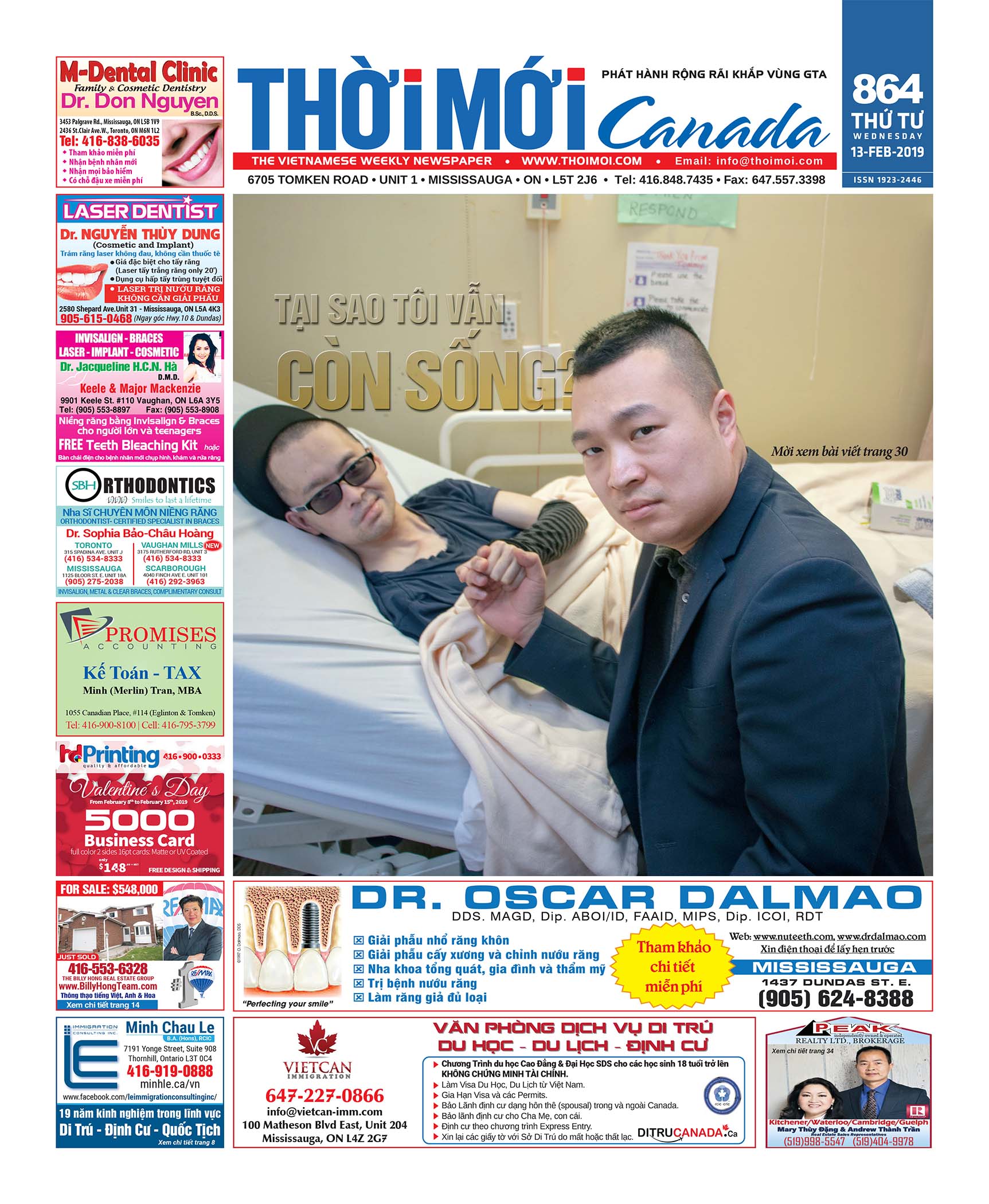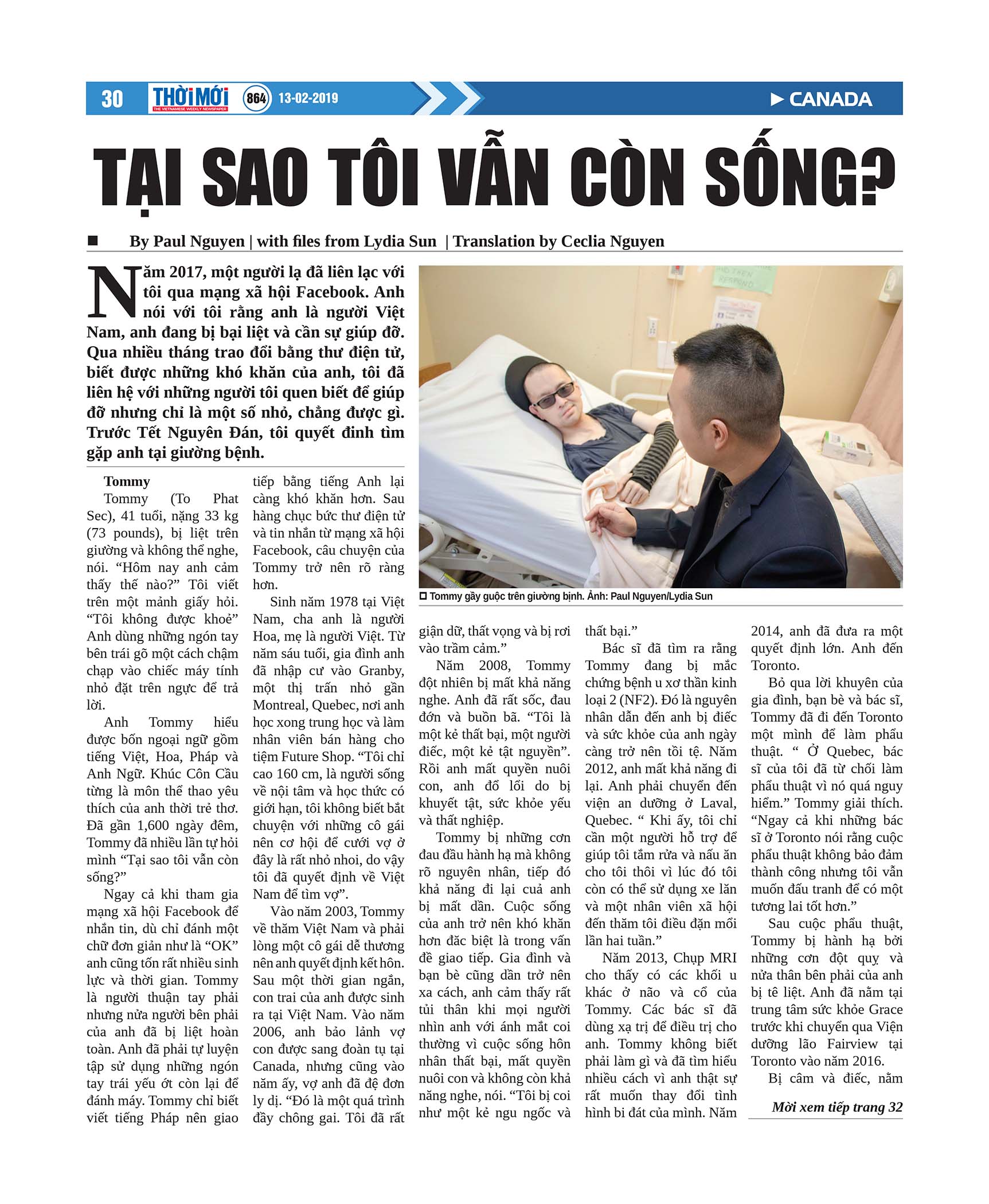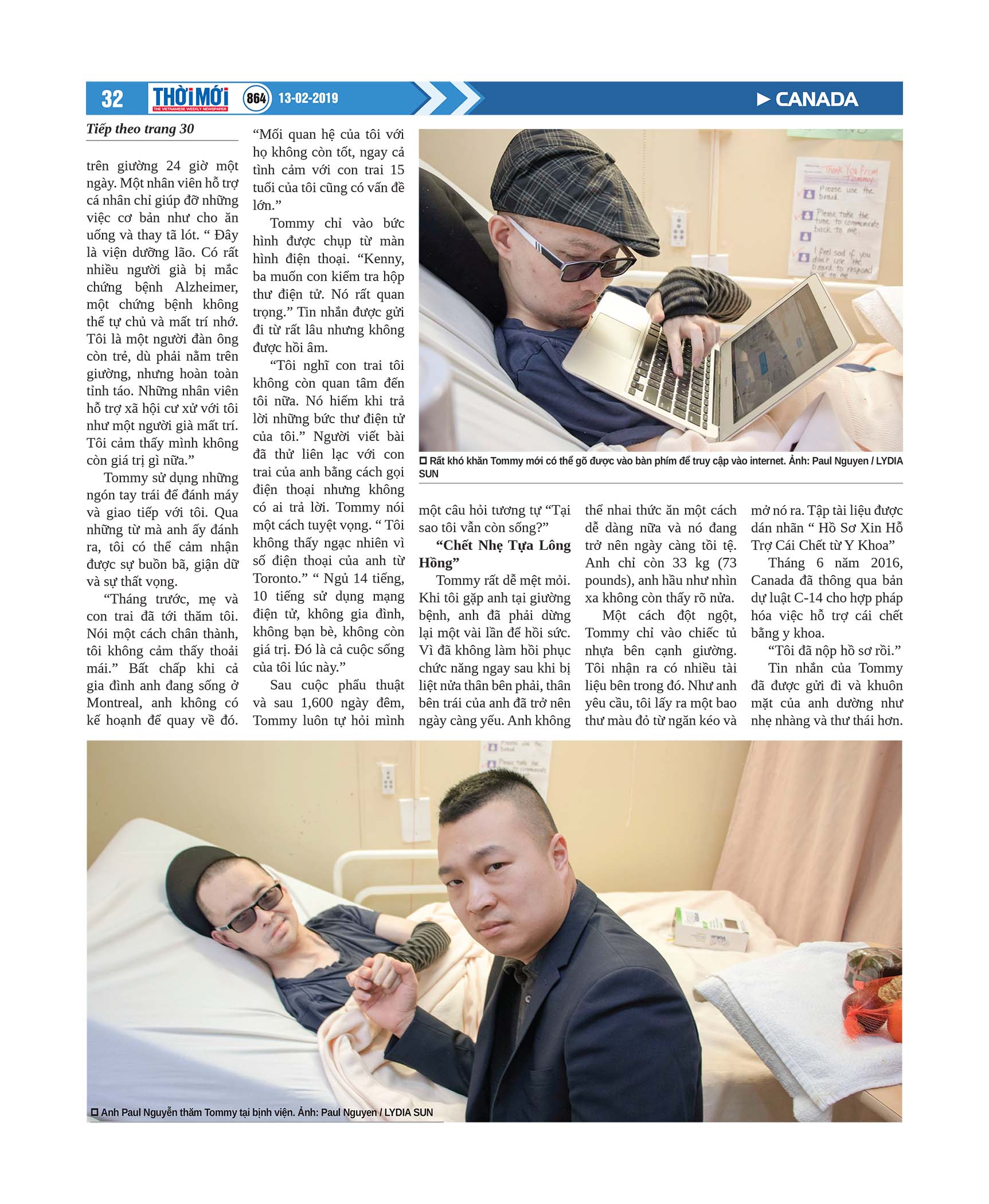|
Why Am I Still Alive?
By Paul Nguyen and
Lydia Sun
February 13,
2019
Introduction
This is the story
of Tommy Sec, a Vietnamese man suffering from a rare condition
called NF-2 and seeking MAID (Medical Assistance in Dying).
Tommy lives in near complete social isolation being paralyzed,
deaf and mute. He can only communicate by computer, using his
only functioning hand. Due to Tommy's special needs, the written interview was conducted through in-person texting. The interview was conducted in English and translated for Vietnamese and Chinese audiences. For the short film, a script was culled from emails written by Tommy with his approval. The voiceover narration was recorded by Vinh Nguyen, a young Vietnamese man with an intellectual disability, living in Australia. Update: Why Am I Still Alive? won the 2019 CEMA Award in the Internet category. 
 Chinese version at
51.ca
/ Vietnamese
version at
Thời Mới
Chinese version at
51.ca
/ Vietnamese
version at
Thời Mới


 English version
In 2017, a random
stranger contacted me through Facebook. He told me he is
Vietnamese and paralyzed and wanted help. Over the course of
many months, we exchanged emails as I learned more about his
ordeal. I used my network to try to find him help but with
little success. I decided to visit him just days before the
Lunar New Year, at his bedside.
English version
In 2017, a random
stranger contacted me through Facebook. He told me he is
Vietnamese and paralyzed and wanted help. Over the course of
many months, we exchanged emails as I learned more about his
ordeal. I used my network to try to find him help but with
little success. I decided to visit him just days before the
Lunar New Year, at his bedside. Tommy Tommy (To Phat Sec), 41 years old, 33 kg (73 pounds), deaf and mute, paralyzed in bed. “How are you today?” I wrote on a piece of paper. “No good” he slowly types using his left hand finger on the laptop sitting on his chest. Tommy understands four languages Vietnamese, Chinese, French and English. His favourite sport was street hockey as a child. For nearly 1,600 days and nights, Tommy again and again asks himself one question, “Why Am I Still Alive?” Even when Tommy joined Facebook Messenger, typing out a simple word like “OK” would require a lot of energy and time. Tommy is right-handed, but now he is completely paralyzed on his right-side. He had to train himself to use his weak left hand finger to type. He only knew how to write in French, so communicating in English is much more difficult for him. After going through over several dozen emails and messages from Facebook, Tommy’s story became clearer. In 1978, Tommy was born in Vietnam. His father was from China and his mother is Vietnamese. When he was six years old, his family immigrated to Granby, a small town near Montreal, Quebec, where he graduated high school and worked as a salesman for Future Shop. “Because I am only 5 feet 2 inches tall (160cm), with limited education and introverted personality, I did not know how to talk to girls, so it was a low chance to find a wife here. So, I decided to go back to Vietnam to find one.” In 2003, Tommy travelled back to Vietnam and found a beautiful girl and got married. Shortly thereafter, his son was born in Vietnam. In 2006, he successfully sponsored his wife and son to come to Canada. In the same year, his wife filed for divorce. “The whole process was really complicated. I was very angry and disappointed. I even had depression.” In 2008, Tommy suddenly lost his hearing. He was in shock, in pain, and depressed. “I’m a loser. I’m deaf. I am disabled”. He lost custody of his son and blamed it on his disability, health condition, and not having a job. Tommy did not know why he had always experienced severe headaches. And then slowly, he lost his ability to talk. This made his daily life very difficult, especially communicating with others. Tommy believes the relationship with his family and friends grew distant because of his condition. He felt sensitive when others looked down on him because of his failed marriage, lost child custody, and being deaf and mute. “I’m seen as an idiot and loser,” said Tommy. The doctor found out that Tommy had Neurofibromatosis Type 2 (NF2). This was the cause of his deafness and making his health worse. In 2012, he lost his ability to walk. He lived in a nursing home in Laval, Quebec. “At the time, I only needed a personal support worker to help me bathe and cook for me. Back then I was able to use a wheelchair, and a social worker would visit me every other week.” In 2013, an MRI scan revealed other tumours in Tommy’s brain and neck. The doctors used radiotherapy to treat him. Tommy didn’t know what to do. He did a lot of research because he really wanted to change his situation. In 2014, he made a big decision. He went to Toronto. Going against advice from family and friends and his doctors, Tommy went to Toronto by himself to get surgery. “In Quebec, my doctors refused to do the surgery because it was too dangerous.” Tommy explained. “Even the doctors in Toronto said the surgery is not guaranteed, but I still wanted to try to fight for a better future.” After surgery, Tommy suffered several strokes and the right-side of his body became paralyzed. He stayed at Toronto Grace Health Centre before moving to Fairview Nursing Home in 2016. Deaf and mute. Bound to a bed 24 hours a day. A personal support worker only provided basic feeding and changing of his diapers. “This is a nursing home. There are a lot of seniors who have Alzheimer’s, incontinence and dementia. I am a young man, who’s laying here in bed, but fully alert. The personal support workers treat me like a senior. I feel like I have no dignity.” Tommy uses his left hand finger to type and communicate with me. From all the words he typed, I can see his depression, anger and frustration. “Last month, my mom and son came to visit me. To be honest, I felt uncomfortable”. Despite all of his family living in Montreal, he doesn’t plan to go back. “My relationship with them is not good. Also, my relationship with my 15-year-old son is a big problem.” Tommy showed me screenshots from his cell phone. “Kenny, your dad wants you to check your email. It’s very important.” The message was sent long ago with no response. “I think my son doesn’t care about me. He rarely replies to my emails,” said Tommy. I personally tried to reach out to Tommy’s son by calling him but no one picked up. “I’m not surprised because your phone number is from Toronto,” said Tommy. “14 hours of sleep. 10 hours of internet. No family. No friends. No dignity. This is my whole life.” After the surgery, and after 1,600 days and nights, Tommy always asks himself the same question, “Why Am I Still Alive?” Euthanasia Tommy gets tired very easily. When I communicated with him at his bedside, he stopped several times to rest. Because he did not do any rehabilitation after becoming paralyzed on his right side, his left side has become weaker and weaker. He cannot chew food easily, and his chewing ability is getting worse. He is only 33kg (73 pounds) and he is near-sighted. Suddenly, Tommy pointed to a plastic cabinet beside his bed. I noticed there were documents inside. I retrieved the red envelope from inside the drawer. I opened the document and it was labelled “Medical Assistance in Dying Application”. On June 16, 2017, Canada passed Bill C-14 that legalized medical assistance in dying. “I have applied already.” Tommy’s message is sent and his facial expression looks lighter and relaxed.  A follow-up visit to show Tommy on the cover of Thời Mới |
